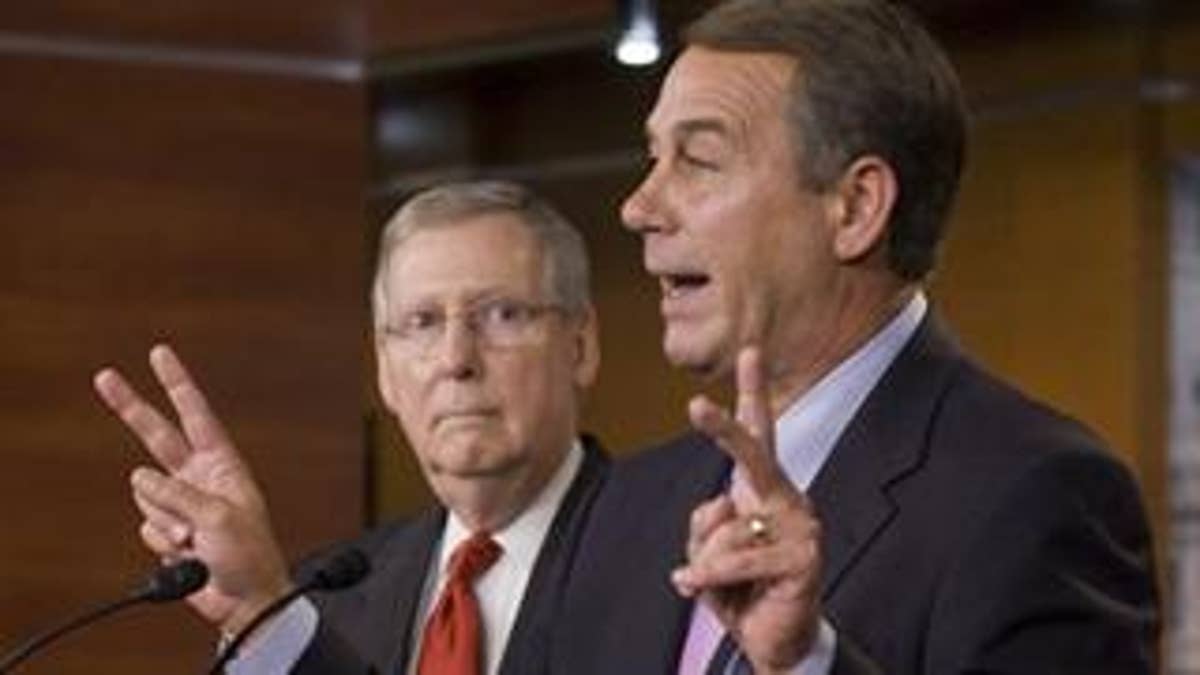
With the bulk of the $787 billion stimulus package still unspent, some lawmakers say, President Obama should not be adding yet another $13 billion to the deficit by funding a one-time $250 Social Security payment.
The complaints are coming from Republicans, who see last February's recovery act as a fiscal blunder that has failed to stem rising unemployment. In some cases, such as the Social Security checks, they see the pot of money still waiting to be spent as a way to head off additional deficit spending in other areas.
After Obama called on Congress to approve the lump-sum payment to Social Security recipients to make up for not getting a cost-of-living increase, House Minority Leader John Boehner said he'd be "happy" to support it -- so long as Congress takes the money out of the stimulus.
"The stimulus bill is not working. The American people are asking, 'Where are the jobs?' And if we're going to provide this benefit to our seniors, why don't we take it from stimulus funds that clearly aren't getting the job done?" Boehner said.
Standing beside him, Senate Minority Leader Mitch McConnell said he'd reserve judgment, since the House would act first on the request. But he indicated an openness to Boehner's idea, saying, "My guess is our members may want to try to pay for it as well."
A chart on the Recovery.gov Web site that tracks spending shows that just 22 percent of the stimulus has been paid out. A White House official said in an e-mail to Foxnews.com that 43 percent, or $339 billion, has been obligated through spending and tax relief.
While the official said the administration is ahead of schedule to meet its spending goals, Republicans see the remainder as untapped resources.
They are also expected to offer an amendment to use stimulus funds to pay for a proposed $245 billion allocation to keep Medicare doctors from being hit with steep cuts in federal reimbursement fees.
And Texas' bipartisan delegation recently wrote to Obama urging him to divert $3 billion to boost NASA's manned space program.
"Boldness does not come cheaply, and in a venture that is inherently risky, we have an obligation to provide the adequate resources to make these worthy goals safe, attainable, and sustainable over time," they wrote. "Since the stated purpose of the stimulus package was to secure good jobs and stabilize our economy, there is no better investment that could be made than the addition of up to $3 billion to NASA in FY2010."
Sen. John Cornyn, R-Texas, said in a statement that since unemployment is at 9.8 percent, the stimulus money that has already been spent is "clearly not working," and so some of the unspent money should be used to "safeguard our nation's space program."
Florida Democratic Sen. Bill Nelson has also signed on to the call to prop up NASA with stimulus cash.
Democratic defenders acknowledge that the economic recovery has been slow and staggered. But they say the impact of the recession would have been a lot of worse had it not been for the stimulus package -- with its tax relief, unemployment checks, state aid, infrastructure funding and other measures. In a benchmark of potential recovery, the Dow Jones Industrial Average also rose past 10,000 this week.
It's unclear whether the administration would consider reallocating any stimulus resources.
Cheryl Arvidson, a spokeswoman with the Recovery Accountability and Transparency Board, said there are certain pots of stimulus money that return to the "federal coffers" anyway if not spent -- though she said most programs do not fall under such a requirement.
"It depends on the program," she said. Arvidson said some programs are on timelines between one and five years, but that there is no need for any of the money to be reauthorized by Congress on an annual basis. For the most part, she said, "It's there."
"We have multiple years to figure this all out," she said.
After Congress settled on a unified stimulus package back in February, the Congressional Budget Office estimated that the bulk of the money would be spent in fiscal 2010, which started Oct. 1. The report estimated that more than 90 percent of it would be spent by the end of fiscal 2011, meaning the stimulus still has a ways to go before running its projected course.
The White House official said any diversion of funds would require congressional action, but noted the administration is ahead of schedule to pay out 70 percent of funds by September 2010. The official said much of the remaining funding already is designated, with more grant awards to be announced in the coming months and about $200 billion in "promised" tax relief still to be committed.
James Horney, director of federal fiscal policy at the Center on Budget and Policy Priorities, said calls to divert the stimulus money are unwarranted. He said one of the reasons that economic growth is projected for next year is that a large portion of the stimulus is yet to be spent.
"The idea that somehow because it hasn't been spent, that it's not important for getting the economy going, is misguided," he said.
But some, including the Center on Budget and Policy Priorities, are warning about the clamor for new spending. Obama's call for additional Social Security payments, for instance, drew recriminations on Friday's newspaper editorial pages. Since seniors received a 5.8 percent boost in January, the additional $250 check was seen more as a political move than a necessary effort to relieve seniors. The Washington Post called it a bid to "buy off" seniors while adding another $13 billion to the national debt.
Horney said there's "no justification" for the increase in terms of inflation, since overall consumer prices have fallen.
Foxnews.com's Judson Berger contributed to this report.




